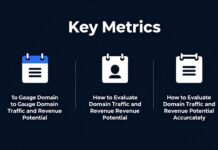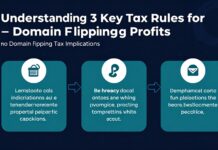When it comes to launching a new website, one of the most crucial decisions you’ll face is choosing between brandable domains and keyword domains. Both options have their unique advantages, but which is better for your online success? In this article, we dive deep into the pros and cons of each type of domain, helping you make an informed decision that aligns with your business goals. Whether you’re a budding entrepreneur or an established business owner, understanding the difference can significantly impact your website’s visibility and branding.
Brandable domains are catchy, unique, and often easier to remember. They can create a strong brand identity and foster customer loyalty. Think of names like “Google” or “Zynga”—these names don’t necessarily describe what the company does but have become synonymous with their services. On the other hand, keyword domains include terms that people are actively searching for, making them potentially more effective for search engine optimization (SEO). For example, a domain like “BestPizzaInNewYork.com” clearly indicates what the website is about, which can attract organic traffic.
So, which domain type should you choose? The answer lies within your goals. If you aim to build a recognizable brand that stands the test of time, a brandable domain may be the way to go. However, if your primary focus is on immediate visibility and attracting specific target audiences, a keyword domain might serve you better. Ultimately, your choice will depend on your long-term vision and marketing strategy. Ready to explore further? Let’s break down the key factors you should consider when making this important decision!
The Ultimate Showdown: Brandable vs. Keyword Domains – Which Will Elevate Your Online Presence?
In the vast world of online business, the importance of a good domain name can’t be overstated. The choice between brandable and keyword domains often leaves many entrepreneurs scratching their heads. Both types of domains have their pros and cons, and understanding them is crucial for anyone hoping to elevate their online presence. So, let’s dive into the ultimate showdown: brandable vs. keyword domains, and see which one might be the best fit for your venture.
What Are Brandable Domains?
Brandable domains are unique, catchy, and often invented words or phrases that can be easily associated with a brand. They tend to be short, memorable, and have the potential for strong branding. A few examples includes:
- Google.com: A name that has become synonymous with search.
- Spotify.com: Combines “spot” and “identify” and sounds cool.
- Zynga.com: A made-up name that’s fun and easy to remember.
Brandable domains are great for businesses looking to create a strong identity and stand out in a crowded market. You can build a brand around these names, which can help foster customer loyalty.
The Pros and Cons of Brandable Domains
Pros:
- Unique Identity: Helps your business to stand out.
- Easier to Trademark: Since they are often unique, they might be easier to protect legally.
- Memorable: Short and catchy names are easier for customers to recall.
Cons:
- Lack of Instant Recognition: New customers may not immediately know what your business does based on the name alone.
- SEO Challenges: These names may not rank as well in search engines without strong branding efforts.
What Are Keyword Domains?
Keyword domains, as the name suggests, include keywords that are relevant to your business or niche. This can enhance your SEO efforts, as search engines often look favorably on domains that contain keywords. Examples include:
- BestPizzaNewYork.com
- AffordableSEOservices.com
- LuxuryWatches.com
These domains usually describe what your business does, making it easier for potential customers to find you through search engines.
The Pros and Cons of Keyword Domains
Pros:
- SEO Advantages: Can improve your search engine ranking due to the inclusion of keywords.
- Clear Message: Customers can instantly understand what your business is about.
- Higher Click-Through Rates: When people see the keyword in the domain, they may be more likely to click on it.
Cons:
- Longer Names: They tend to be longer, which can be harder to remember.
- Limited Branding Potential: They may not allow for much creativity in branding.
- Risk of Being Seen as Spammy: Some users might see keyword domains as less trustworthy.
Comparing Brandable and Keyword Domains
Here’s a table to make the comparison clearer:
| Feature | Brandable Domains | Keyword Domains |
|---|---|---|
| Memorability | Highly memorable | Often less memorable |
| SEO Potential | Lower without branding | Higher due to keywords |
| Branding Opportunities | Strong potential | Limited |
| Legal Protection | Easier to trademark | Harder to protect |
| Length | Usually shorter | Often longer |
Choosing Between Brandable and Keyword Domains: Which Is Better?
When deciding between brandable and keyword domains, consider these factors:
- Your Business Goals: If establishing a unique brand is your priority, then brandable domains might be the way to go. On the other hand, if your focus is on local or niche markets, then keyword domains could be more beneficial.
- Target Audience: Think about who your customers are. Are they searching for specific terms or looking for a brand they recognize?
- Long-Term Vision: Consider where you see your business in the future. Brandable domains might offer more flexibility for expansion, while keyword domains can be great for driving traffic in a specific niche.
- Budget and Resources: Sometimes, brandable domains can be more expensive due to their uniqueness. Determine what fits best within your budget.
In conclusion, the choice between brandable and keyword domains ultimately depends on your specific needs and goals. Each type has its strengths and weaknesses, and understanding them will help you make a more informed decision. Whether you’re aiming for a catchy brand that sticks in people’s minds or a keyword-rich domain that can boost your SEO, know that both paths can lead to success if navigated wisely.
5 Key Factors to Consider When Selecting Between Brandable and Keyword Domains
Choosing the right domain name is a critical decision that can influence your online presence significantly. With so many options available, particularly brandable and keyword domains, it can be kinda overwhelming. This article will dive into 5 key factors you should consider when selecting between brandable and keyword domains. Whether you’re launching a new business or rebranding, understanding these factors is crucial for making an informed choice.
Understanding Brandable Domains
Brandable domains are unique, catchy, and often nonsensical names that are easy to remember. They typically do not contain keywords relevant to the business but instead focus on creating a strong brand identity. For example, names like “Google,” “Zynga,” or “Spotify” are all brandable domains.
Advantages of Brandable Domains:
- Memorability: These names tend to stick in people’s minds, making them easier to recall.
- Flexibility: Brandable names allow for expansion into different markets or products.
- Unique Identity: They help create a distinct brand presence that can stand out in crowded markets.
The Power of Keyword Domains
On the other hand, keyword domains contain relevant keywords that directly relate to the business or industry. They often help with search engine optimization (SEO). For instance, a domain like “BestPizzaNYC.com” clearly indicates what the site is about, which can be beneficial for attracting organic traffic.
Advantages of Keyword Domains:
- SEO Benefits: They may rank higher in search engines due to the inclusion of relevant keywords.
- Clear Purpose: Users can immediately understand what the site offers just by seeing the domain name.
- Potential Traffic: They can attract more clicks from search results because they match user queries.
5 Key Factors to Consider
When deciding between brandable and keyword domains, consider these five crucial factors:
- Target Audience
- Understand who your audience is and what they value. If your target market prefers straightforwardness, a keyword domain might resonate better. However, for a more innovative audience, brandable names can captivate.
- Market Competition
- Look at your competitors. If they are using keyword domains, you might want to consider a similar approach to ensure you’re not left out. Conversely, if the market is saturated with brandable names, a keyword domain might help you stand out.
- Long-term Vision
- Consider your business’s future. If you plan to diversify your offerings, a brandable domain might provide the flexibility you need. Keyword domains can sometimes limit your brand’s growth if you pivot into different areas.
- SEO Strategy
- If your primary goal is to drive organic traffic, keyword domains could give you an edge in search engine rankings. However, if you’re focused on building a memorable brand, prioritize brandable names.
- Domain Availability and Pricing
- Sometimes, the best option is simply what’s available. Brandable domains might be more affordable and easier to acquire, while good keyword domains can be expensive due to their perceived value. Always check domain registrars for what’s out there.
Making the Right Choice: Brandable vs. Keyword Domains
Here’s a quick comparison table to help visualize the differences:
| Feature | Brandable Domains | Keyword Domains |
|---|---|---|
| Memorability | High | Moderate |
| SEO Potential | Low | High |
| Flexibility | High | Low |
| Brand Identity Creation | Strong | Weak |
| Initial Cost | Often lower | Typically higher |
Practical Examples
Imagine you’re starting a business selling eco-friendly products. A brandable domain like “EcoFlect.com” is catchy and can represent your brand well. However, if your primary focus is on local traffic, “GreenProductsNYC.com” might be the better choice for SEO purposes.
Additionally, consider the marketing angle. A brandable name allows for creative advertising campaigns, while a keyword domain might lead to straightforward, functional marketing messages.
When it comes to selecting between brandable and keyword domains, there’s no one-size-fits-all answer. Each option has its own merits and can cater to different business models and goals. Ultimately, the right choice depends on your unique situation, audience, and long-term plans. So think about these factors carefully and pick what aligns best with your vision. Your domain name is the first step in building your online identity, so choose wisely!
Unlocking Success: How Brandable Domains Can Drive More Traffic Than Keyword Domains
Choosing the right domain name is crucial for any business or brand. Many people wonder whether they should invest in brandable domains or keyword domains. It’s a big decision, and understanding the difference can help unlock success. So, let’s dive into how brandable domains can drive more traffic than keyword domains and the factors to consider when choosing between them.
Brandable Domains: The New Trend
Brandable domains are those unique, catchy names that are easy to remember. They often don’t carry specific meanings but resonate with the audience. For example, names like “Google” or “Zynga” don’t describe what the companies do, but they’ve become household names. The benefits of brandable domains include:
- Memorability: A catchy name sticks better in people’s minds.
- Flexibility: Can be used for various purposes, adapting as your business evolves.
- SEO Friendly: They can still rank well if combined with good content strategies.
In contrast, keyword domains often include specific words related to a business’s niche, like “bestshoes.com.” While they can help with SEO, they lack the distinctive factor that brandable names have.
Keyword Domains: The Traditional Choice
Keyword domains have been long popular among online business owners. They can give a quick idea of what a site is about, which can be helpful for users and search engines. Here are some pros and cons of keyword domains:
Pros:
- Immediate Clarity: Users know what to expect when they visit the site.
- Potential SEO Advantages: Having keywords can help with search rankings, especially if the competition’s low.
Cons:
- Limited Appeal: They might not be as attractive or memorable.
- Branding Challenges: Harder to transition if the business expands beyond the original keywords.
Brandable vs. Keyword Domains: The Big Debate
Choosing between brandable and keyword domains often feels like a tug-of-war. Here’s a comparison to help highlight the differences:
| Feature | Brandable Domains | Keyword Domains |
|---|---|---|
| Memorability | High | Moderate |
| SEO Potential | Moderate | High |
| Flexibility | Very High | Low |
| Branding Opportunities | High | Limited |
| Long-term Viability | High | Medium |
Real-World Examples
To illustrate, consider two companies that chose different paths.
- Brandable Example: “Spotify” is a brandable domain. It doesn’t tell you that it’s a music streaming service, but it’s catchy and memorable. This helped them build a strong brand identity and loyal user base.
- Keyword Example: “BestVacuumCleaner.com” clearly states what the site is about. It ranks well for specific searches, but it doesn’t have the same brand potential as Spotify. If they wanted to expand into other home appliances, it would be difficult.
The Importance of Niche and Long-Term Goals
When deciding, it’s vital to think about your business’s niche and long-term goals. If you’re starting a niche blog or an e-commerce site focusing on a specific product, a keyword domain might work better in the short term. However, if you are aiming to build a brand that can expand into different areas, then investing in a brandable domain could be the better choice.
Tips for Choosing the Right Domain
Here are some practical tips for choosing between brandable and keyword domains:
- Think Long-Term: Consider how your business might evolve.
- Audience Appeal: What resonates with your target audience?
- Domain Availability: Check if the name you want is available.
- Trademark Issues: Ensure that your chosen name doesn’t infringe on existing trademarks.
Conclusion
In the end, the decision of choosing between brandable and keyword domains boils down to your business strategy. Brandable domains can unlock a world of creativity and flexibility, while keyword domains afford immediate clarity and potential SEO benefits. Knowing your goals and understanding the strengths and weaknesses of each can lead to a domain that not only drives traffic but also carves out a unique space in the crowded digital landscape. So, take your time, do your research, and choose wisely. Your domain name could be the first step toward your success.
Keyword Domains vs. Brandable Domains: Which One Boosts Your SEO Efforts More Effectively?
In the ever-evolving world of digital marketing, one question keeps popping up: which type of domain name is better for your SEO efforts, keyword domains or brandable domains? The choice between these two can be a bit tricky, and many business owners finds themselves confused. Let’s dig into the nitty-gritty of keyword domains versus brandable domains, examining their pros and cons, and helping you decide which really boosts your SEO more effectively.
Understanding Keyword Domains
Keyword domains are those that include specific keywords relevant to your business or niche. For example, a domain like “bestcheesepizza.com” includes the keywords “best,” “cheese,” and “pizza.” Historically, these types of domains was favored by search engines like Google because they made it clear what the website was about.
Pros of Keyword Domains:
- SEO Benefits: They can help improve your search engine rankings for specific keywords.
- Immediate Clarity: Users immediately know what your site is about just by looking at the domain name.
- Potential for Higher CTR: Keywords in the domain can increase click-through rates because people trust sites that seems relevant to their search.
Cons of Keyword Domains:
- Limited Branding: They might not be memorable or unique.
- Over-Saturation: Many keyword domains are taken, making it harder to find a good one.
- Tendency Toward Spam: Some users may associate them with low-quality or spammy websites.
The Allure of Brandable Domains
On the other hand, brandable domains are usually made-up words or unique phrases that don’t necessarily relate to the keywords. A classic example is “Google” or “Zillow.” These names are catchy and can be easily branded, often leading to strong brand recognition over time.
Pros of Brandable Domains:
- Memorability: Unique names are typically easier for customers to remember.
- Flexibility: Allows for expansion into different products or services without being tied to specific keywords.
- Enhanced Branding: They provide a blank canvas for your branding efforts.
Cons of Brandable Domains:
- Less Immediate Clarity: Users might not know what the site is about without additional context.
- Initial SEO Challenges: They may require more effort in SEO since they don’t contain keywords.
- Potential Missed Traffic: Some users may not search for a brandable name, thus missing your site altogether.
Comparing the Two: A Quick Overview
Here’s a simple comparison table to help visualize the differences:
| Feature | Keyword Domains | Brandable Domains |
|---|---|---|
| SEO Benefits | High for specific keywords | Lower initial SEO benefits |
| Memorability | Generally less memorable | Highly memorable |
| Flexibility | Limited to specific niche | Great for expansion |
| Branding Potential | Moderate | High |
| Risk of Spam | Higher perception of spam | Lower perception of spam |
| Availability | Often taken | More availability |
Choosing Between Brandable and Keyword Domains
When choosing between brandable and keyword domains, it can help to consider the following factors:
- Target Audience: Who are you trying to reach? If they’re searching for specific keywords, a keyword domain might work better.
- Long-Term Goals: If you plan on expanding your business, a brandable domain might serve you better in the long run.
- Market Research: Investigate what competitors are doing. Are they using keyword domains, brandable names, or a mix of both?
- SEO Strategy: If your primary focus is immediate SEO results, keyword domains may provide a quicker return on investment.
Practical Examples
- Keyword Domain Example: “bestphotographyadvice.com” could attract users searching for photography tips and tricks.
- Brandable Domain Example: “Snapify.com” doesn’t tell you much at first, but it’s catchy and can be marketed effectively.
In the end, the decision between keyword domains and brandable domains isn’t a one-size-fits-all scenario. Each option has its own set of advantages and challenges, and the best choice depends on your specific business needs and goals. Consider what fits your brand and audience better, and don’t be afraid to experiment with both types. After all, the digital landscape is vast, and there’s room for creativity and innovation in how you establish your online presence.
The Pros and Cons of Brandable and Keyword Domains: What Every Entrepreneur Needs to Know
Choosing the right domain name can be a game-changer for any business. Entrepreneurs often find themselves at a crossroads between brandable and keyword domains. Understanding the pros and cons of each can help you make a informed decision that aligns with your business goals. In this article, we delve into the nuances of brandable and keyword domains, weighing their advantages and disadvantages, while providing examples and insights that every entrepreneur needs to know.
What are Brandable Domains?
Brandable domains are unique, catchy names that are often made-up words or combinations that doesn’t necessarily describe the service or product being offered. Think of names like “Google” or “Spotify.” These names are memorable and can be marketed effectively over time.
Pros of Brandable Domains:
- Memorability: Since they are unique, brandable domains often stick in people’s minds.
- Flexibility: They can be used across various industries without pigeonholing your brand.
- Strong Branding Potential: A well-crafted brandable domain can become synonymous with quality or service.
Cons of Brandable Domains:
- Lack of Immediate Clarity: New visitors might not understand what the business does just by hearing the name.
- Requires Marketing: More effort is needed to build brand recognition and awareness.
- Possible Spelling Confusion: Unique spellings may lead to typos when people search for your site.
What are Keyword Domains?
Keyword domains, on the other hand, contain specific keywords relevant to the business and its industry. For example, “BestCoffeeBeans.com” clearly indicates what the site is about.
Pros of Keyword Domains:
- Immediate Relevance: Visitors can instantly understand the purpose of the website.
- SEO Benefits: Including keywords can positively impact search engine rankings, making it easier for your target audience to find you.
- Lower Initial Marketing Costs: Because they are descriptive, these domains may require less brand-building compared to brandable names.
Cons of Keyword Domains:
- Limited Creativity: They might sound generic and unremarkable, making it harder to stand out.
- Potential for Over Saturation: Many keyword domains are already taken, making it difficult to find a good one.
- Branding Challenges: If the business expands, the name might not fit future offerings or services.
Comparing Brandable and Keyword Domains
When it comes to choosing between these two types of domains, it’s important to consider your long-term goals. Here’s a quick comparison:
| Feature | Brandable Domains | Keyword Domains |
|---|---|---|
| Memorability | High | Medium |
| SEO Potential | Medium | High |
| Brand Flexibility | High | Low |
| Initial Clarity | Low | High |
| Marketing Needs | High | Medium |
Practical Examples and Scenarios
Let’s say you’re starting a new online store selling eco-friendly products. You might consider a brandable name like “EcoVerve” which is catchy and has the potential for strong branding. On the flip side, a keyword domain like “EcoFriendlyProducts.com” would instantly inform potential customers about what you offer.
In another case, if you are offering online tutoring services, a brandable name like “Tutorly” might be more effective in the long run, while a keyword domain like “OnlineTutoring.com” could attract immediate traffic due to its clarity.
The Decision-Making Process
When deciding between brandable and keyword domains, ask yourself these questions:
- What’s your budget for marketing and branding?
- How do you envision your business evolving in the future?
- What is your target audience looking for in a domain name?
Considerations:
- If you’re aiming for a niche market, a brandable domain may help you stand out.
- If your focus is on local SEO and immediate traffic, a keyword domain may serve you better.
Final Thoughts
Navigating the domain name landscape can be overwhelming, especially with the options available. Each choice comes with its own set of advantages and challenges. Brandable domains can elevate your brand and foster loyalty, while keyword domains can provide immediate clarity and SEO advantages. Ultimately, the best choice depends on your unique business needs and goals. By weighing the pros and cons and considering your long-term vision, you can make an informed decision that sets your entrepreneurial journey on the right path.
Conclusion
In conclusion, choosing between brandable and keyword domains is a critical decision that can significantly impact your online presence. Brandable domains offer uniqueness and flexibility, allowing for creative marketing strategies that can foster strong brand identity and customer loyalty. On the other hand, keyword domains provide immediate SEO benefits by incorporating relevant search terms, potentially driving organic traffic right from the start. Ultimately, the choice should align with your long-term business goals, target audience, and marketing strategy. If you prioritize brand identity and long-term growth, a brandable domain might be the best fit. Conversely, if immediate visibility and search engine ranking are your primary concerns, a keyword-rich domain could be advantageous. We encourage you to weigh these factors carefully and select a domain that not only resonates with your brand vision but also positions you effectively in your market. Start brainstorming today to secure a domain that will propel your business forward!












